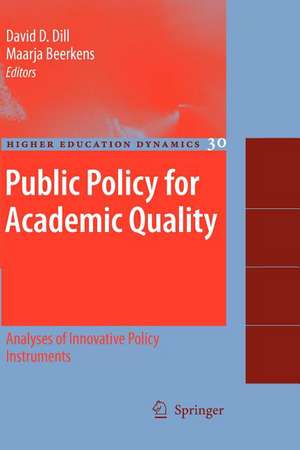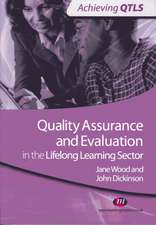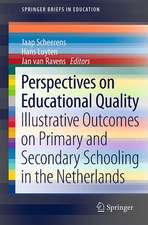Public Policy for Academic Quality: Analyses of Innovative Policy Instruments: Higher Education Dynamics, cartea 30
Editat de David D. Dill, Maarja Beerkensen Limba Engleză Paperback – 28 iun 2012
The growing public debate about academic quality assurance within and across countries however has not always been well informed by analyses of the strengths and weaknesses of these new policy instruments. The Public Policy for Academic Quality Research Program (PPAQ) was designed to provide systematic analyses of innovative external quality assurance policies around the world. This volume presents the fourteen analyses of national policies on academic quality assurance conducted as part of the PPAQ Research Program utilizing the knowledge of informed international scholars. Each policy analysis examines the policy goals, implementation problems, and impacts of these newly developed national quality assurance instruments. The book concludes with an assessment of the lessons learned from these collected policy analyses and outlines the framework conditions that appear essential for assuring academic standards in the university sector.
| Toate formatele și edițiile | Preț | Express |
|---|---|---|
| Paperback (1) | 630.46 lei 6-8 săpt. | |
| SPRINGER NETHERLANDS – 28 iun 2012 | 630.46 lei 6-8 săpt. | |
| Hardback (1) | 636.73 lei 6-8 săpt. | |
| SPRINGER NETHERLANDS – 29 mai 2010 | 636.73 lei 6-8 săpt. |
Din seria Higher Education Dynamics
- 15%
 Preț: 635.13 lei
Preț: 635.13 lei - 15%
 Preț: 637.54 lei
Preț: 637.54 lei - 18%
 Preț: 938.22 lei
Preț: 938.22 lei - 18%
 Preț: 930.48 lei
Preț: 930.48 lei - 18%
 Preț: 879.44 lei
Preț: 879.44 lei - 15%
 Preț: 626.80 lei
Preț: 626.80 lei - 15%
 Preț: 635.45 lei
Preț: 635.45 lei - 15%
 Preț: 631.92 lei
Preț: 631.92 lei - 15%
 Preț: 628.89 lei
Preț: 628.89 lei - 15%
 Preț: 623.76 lei
Preț: 623.76 lei - 15%
 Preț: 631.14 lei
Preț: 631.14 lei - 18%
 Preț: 926.76 lei
Preț: 926.76 lei - 15%
 Preț: 627.61 lei
Preț: 627.61 lei - 15%
 Preț: 633.23 lei
Preț: 633.23 lei - 15%
 Preț: 631.61 lei
Preț: 631.61 lei - 15%
 Preț: 631.77 lei
Preț: 631.77 lei - 18%
 Preț: 927.07 lei
Preț: 927.07 lei - 15%
 Preț: 632.73 lei
Preț: 632.73 lei - 15%
 Preț: 632.73 lei
Preț: 632.73 lei - 15%
 Preț: 629.19 lei
Preț: 629.19 lei - 15%
 Preț: 632.73 lei
Preț: 632.73 lei - 15%
 Preț: 626.80 lei
Preț: 626.80 lei - 18%
 Preț: 932.97 lei
Preț: 932.97 lei - 18%
 Preț: 926.63 lei
Preț: 926.63 lei - 15%
 Preț: 630.64 lei
Preț: 630.64 lei - 15%
 Preț: 628.24 lei
Preț: 628.24 lei - 15%
 Preț: 625.20 lei
Preț: 625.20 lei - 15%
 Preț: 630.15 lei
Preț: 630.15 lei
Preț: 630.46 lei
Preț vechi: 741.72 lei
-15% Nou
Puncte Express: 946
Preț estimativ în valută:
120.77€ • 127.81$ • 100.03£
120.77€ • 127.81$ • 100.03£
Carte tipărită la comandă
Livrare economică 22 ianuarie-05 februarie 25
Preluare comenzi: 021 569.72.76
Specificații
ISBN-13: 9789400732223
ISBN-10: 9400732228
Pagini: 360
Ilustrații: X, 271 p.
Dimensiuni: 155 x 235 x 19 mm
Greutate: 0.5 kg
Ediția:2010
Editura: SPRINGER NETHERLANDS
Colecția Springer
Seria Higher Education Dynamics
Locul publicării:Dordrecht, Netherlands
ISBN-10: 9400732228
Pagini: 360
Ilustrații: X, 271 p.
Dimensiuni: 155 x 235 x 19 mm
Greutate: 0.5 kg
Ediția:2010
Editura: SPRINGER NETHERLANDS
Colecția Springer
Seria Higher Education Dynamics
Locul publicării:Dordrecht, Netherlands
Public țintă
ResearchCuprins
Professional (Self) Regulation of Academic Quality.- External Examiner System in the UK: Fresh Challenges to an Old System.- The Teacher Education Accreditation Council (TEAC) in the USA.- Market Regulation of Academic Quality.- The CHE University Ranking in Germany.- The US National Survey of Student Engagement (NSSE).- The Course Experience Questionnaire, Graduate Destination Survey, and Learning and Teaching Performance Fund in Australia.- National Report Card on Higher Education in the USA.- State (Direct) Regulation of Academic Quality.- The Australian Qualifications Framework.- Subject Benchmarking in the UK.- Subject Assessments for Academic Quality in Denmark.- Education Quality Audit as Applied in Hong Kong.- The German System of Accreditation.- The Accreditation and Quality Processes of the General Medical Council in the UK.- Contracting for Quality Improvement and Financing in Public Universities of Catalonia, Spain.- The National Assessment of Courses in Brazil.- Reflections and Conclusions.
Recenzii
From the reviews:
“There is much of interest in this book for students of public policy for academic quality. An impressive array of talented authors contributes the case studies. Even if the reader is familiar with the specific topic, each chapter managed to produce some unusual nuggets of information in addition to capturing the main components of the debate over design and implementation. … The volume, laudably, argues for scholarly, evidence-based, and reliable approaches to public-policy initiatives to assure academic standards and quality.” (George Gordon, Educational Review, October, 2011)
“Having an entire book discussing the concept of academic quality … is very innovative and instructive. … Public policy for academic quality does a very good job in including instruments of analysis which help the reader to understand academic quality in many forms. … The main focus of Public policy for academic quality on academic quality and its illustrations through country case studies makes this book a very pleasant read. Many instruments are student-based regulations, which help to illustrate policies and instruments for lifelong learning.” (Ali Ait Si Mhamed, International Review of Education, Vol. 57 (5-6), December, 2011)
“There is much of interest in this book for students of public policy for academic quality. An impressive array of talented authors contributes the case studies. Even if the reader is familiar with the specific topic, each chapter managed to produce some unusual nuggets of information in addition to capturing the main components of the debate over design and implementation. … The volume, laudably, argues for scholarly, evidence-based, and reliable approaches to public-policy initiatives to assure academic standards and quality.” (George Gordon, Educational Review, October, 2011)
“Having an entire book discussing the concept of academic quality … is very innovative and instructive. … Public policy for academic quality does a very good job in including instruments of analysis which help the reader to understand academic quality in many forms. … The main focus of Public policy for academic quality on academic quality and its illustrations through country case studies makes this book a very pleasant read. Many instruments are student-based regulations, which help to illustrate policies and instruments for lifelong learning.” (Ali Ait Si Mhamed, International Review of Education, Vol. 57 (5-6), December, 2011)
Textul de pe ultima copertă
This volume summarizes a significant body of research systematically analyzing innovative external quality assurance policies in higher education around the world. It will be essential reading for policy makers, administrators and researchers alike.
Over the last decade the structure of higher education in most countries has undergone significant change. This change, brought about by social demands for expanded access, technological developments, and market forces, has seen the traditional concerns with access and cost supplemented by a fresh concern with academic quality. As a result new public policies on academic quality assurance have rapidly emerged and migrated around the globe.
However, the public debate about new academic quality assurance policies, both within and across countries, has not always been informed by reliable analyses of the strengths and weaknesses of these innovative instruments. It is this gap that the current edited volume seeks to fill. It is based on the work of the Public Policy for Academic Quality research program (PPAQ), which was designed to provide systematic analyses of innovative external quality assurance policies around the world. This volume, informed by key international scholars, presents the fourteen analyses conducted as part of the PPAQ research program. Each analysis examines the policy goals, implementation problems, and impacts of these newly developed national quality assurance instruments. The book concludes with an assessment of the lessons learned from these collected policy analyses and outlines the framework conditions that appear essential for assuring academic standards in the university sector.
Over the last decade the structure of higher education in most countries has undergone significant change. This change, brought about by social demands for expanded access, technological developments, and market forces, has seen the traditional concerns with access and cost supplemented by a fresh concern with academic quality. As a result new public policies on academic quality assurance have rapidly emerged and migrated around the globe.
However, the public debate about new academic quality assurance policies, both within and across countries, has not always been informed by reliable analyses of the strengths and weaknesses of these innovative instruments. It is this gap that the current edited volume seeks to fill. It is based on the work of the Public Policy for Academic Quality research program (PPAQ), which was designed to provide systematic analyses of innovative external quality assurance policies around the world. This volume, informed by key international scholars, presents the fourteen analyses conducted as part of the PPAQ research program. Each analysis examines the policy goals, implementation problems, and impacts of these newly developed national quality assurance instruments. The book concludes with an assessment of the lessons learned from these collected policy analyses and outlines the framework conditions that appear essential for assuring academic standards in the university sector.
Caracteristici
Summarizes the results from the multi-year international research program on Public Policy for Academic Quality (PPAQ) Presents analyses of fourteen innovative national academic quality assurance instruments, which provide systematic, fair-minded assessments of the goals, implementation problems, and impacts of these new policies The authors of each analysis are respected and informed international scholars in the field Includes an assessment of the lessons learned from the collected analyses and suggests the national framework conditions necessary to assure academic standards Unique in providing systematic policy analyses of new and innovative national quality assurance policies

















